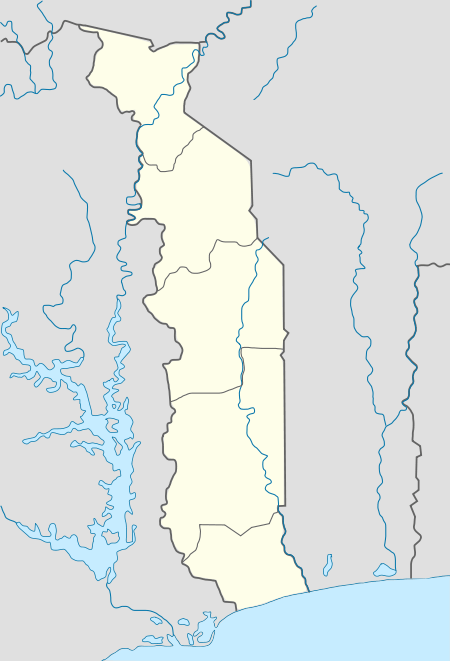Kara, Togo
Kara is a city in northern Togo, situated in Kara Region, 413 km north of the capital Lomé. Kara is the capital of the Kara region and, according to the 2010 census, had a population of 94,878. The Kara River flows through the city and is its main resource of water. Originally known as Lama-Kara, the city developed from the village of this name that still exists into an administrative centre. Étienne Eyadéma was born in the nearby village of Piya.
Kara | |
|---|---|
 | |
 Kara Location in Togo and Haugeau River | |
| Coordinates: 9°32′56″N 1°11′26″E | |
| Country | |
| Region | Kara Region |
| Elevation | 312 m (1,024 ft) |
| Population (2010) | |
| • Total | 94,878 |
History
In 1902, a bridge over the Kara River was built by the Germans, which marks the beginning of the city. [1] Under the presidency of Gnassingbé Eyadéma, in the 1970s, the city developed particularly because of its role in holding political events. [2]
Geography
.jpg)
The city is at the foot of the mountainous massif of Kabiyé country. Kara is at an altitude of about 400 meters. The Kara River is in the center of the city.
Economy

Subsistence agriculture is the main economic activity in Kara; the majority of the population depends on subsistence agriculture. Food and cash crop production employs the majority of the labor force and contributes about 42% to the gross domestic product (GDP). Coffee and cocoa are traditionally the major cash crops for export, but cotton cultivation increased rapidly in the 1990s, with 173,000 metric tons produced in 1999.
After a disastrous harvest in 2001 (113,000 metric tons), production rebounded to 168,000 metric tons in 2002. Despite insufficient rainfall in some areas, the Togolese Government has achieved its goal of self-sufficiency in food crops — maize, cassava, yams, sorghum, pearl millet, and groundnut. Small and medium-sized farms produce most of the food crop; the average farm size is one to three hectares.
Transportation
The city is served various by bus lines to Lomé and Ouagadougou, including Etrab, LK, Adji, and Rakieta. Niamtougou International Airport is located 40 kilometers north of Kara.
Energy
The Compagnie Energie Eléctrique du Togo reported in 2001 that Ghana supplied the city with 0.520 TWh of electricity.
Education
In 1996, the gross primary enrollment rate was 119.6 percent, and the net primary enrollment rate was 81.3 percent. The education system has suffered from teacher shortages, lower educational quality in rural areas, and high repetition and dropout rates.
A second national university was created in Kara in 2004. The University of Kara is located at the edge of the city.
Culture
Historically known as "Tamberma Country", this area, inhabited by the Batammariba, has been officially named "Koutammakou" since it was inscribed in 2004 by the World Heritage Committee appointed by the UNESCO, as a World Heritage site. [3]
Every July, a traditional wrestling tournament takes place in and around Kara. It is the first step in the Kabiye male initiation rite towards adulthood. The tournaments are organised by neighbourhood, by village and by canton. The Head of State attends the tournament.
Architecture
The city has some buildings of architectural interest, such as the Congress Hall.
Places of worship
Among the places of worship, they are predominantly Christian churches and temples : Roman Catholic Diocese of Kara (Catholic Church), Evangelical Presbyterian Church of Togo (World Communion of Reformed Churches), Togo Baptist Convention (Baptist World Alliance), Living Faith Church Worldwide, Redeemed Christian Church of God, Assemblies of God.[4] There are also Muslim mosques.
Notable residents
- Gnassingbé Eyadéma the President of Togo from 1967 until his death in 2005.
References
- Nicoué Gayibor, Histoire des Togolais. Des origines aux années 1960 - Tome 3, KARTHALA Editions, France, 2011, p. 387
- DIOP Amadou, AGOSSOU Noukpo, NYASSOGBO Kwami Gabriel, Systèmes spatiaux et structures régionales en Afrique, KARTHALA Editions , France, 2010, p. 97
- Koutammakou, le pays des Batammariba
- J. Gordon Melton, Martin Baumann, ‘‘Religions of the World: A Comprehensive Encyclopedia of Beliefs and Practices’’, ABC-CLIO, USA, 2010, p. 2875-2877
External links
- MalariaNIMBY.org Malaria Not In My Back Yard, a non-profit organization to eradicate malaria, (paludisme) in this city.
| Wikimedia Commons has media related to Kara. |